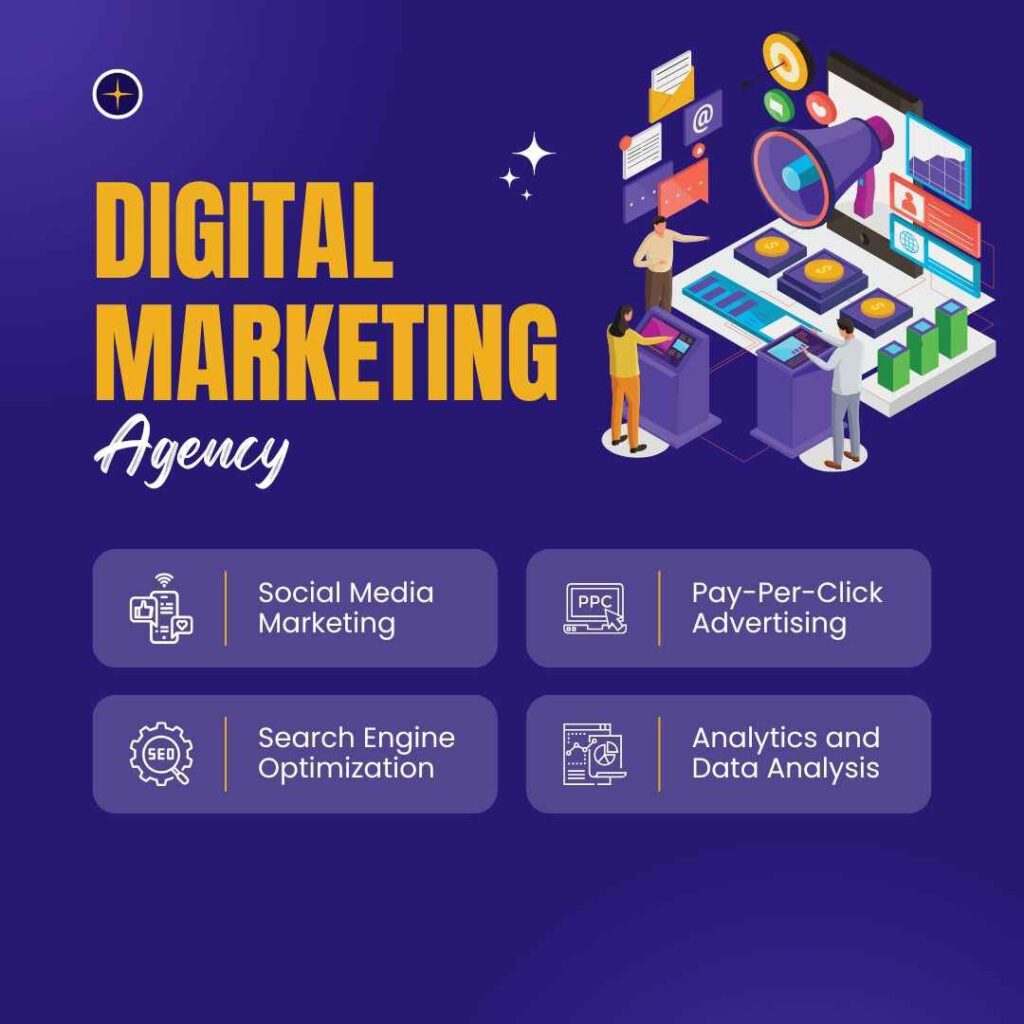How to Start a Digital Marketing Agency
How to start a digital marketing agency may be a rewarding experience if done right. There is a lot of potential in this industry as businesses of all sizes work to improve their online presence. This comprehensive guide will walk you through every step of starting your agency.
Step 1: Define Your Niche
The Importance of Niche Selection
You don’t want to be everything to everyone in the vast world of digital marketing. You may stand out, develop your expertise, and draw in the ideal customers by concentrating on a specialization.
Examples of Niche Selection: Industry-Based Niches
Real estate: Provide ad campaigns, social media management, and SEO to real estate businesses and brokers.
E-commerce: Pay attention to conversion rate optimization for online retailers and sponsored advertisements on Facebook and Google Ads.
Health & Wellness: Provide local SEO and content marketing support to wellness brands, gyms, and health coaches.
Service-based Niches:
Search engine optimization (SEO) is the area of expertise for companies trying to increase their organic traffic.
Social Media Management: Take care of influencers’ or small businesses’ Instagram, Facebook, and Twitter profiles.
Paid Ads: Pay only attention to campaigns using paid media, such as YouTube, Facebook, and Google Ads.
Platform-based Niches:
Instagram marketing: Help companies in increasing their Instagram followers and bringing in new customers.
LinkedIn Marketing: Focus on personal branding and lead creation for business-to-business (B2B) organizations on LinkedIn.
Google Ads Specialist: Provide knowledge and experience in developing and overseeing effective Google Ads campaigns.


Step 2: Acquire and Perfect the Fundamental Skills To Start a Digital Marketing Agency
thankfully you don’t have to be an expert in every field, you should be knowledgeable about the following crucial aspects of digital marketing to help your clients:
Key Skills to Learn: Search Engine Optimization (SEO): Discover how to increase organic traffic and website rankings.
Learn about Google Ads, Facebook Ads, and other paid advertising platforms using PPC (Pay-Per-Click) technology.
information marketing is the process of producing and disseminating worthwhile information to draw in and involve clients.
Social Media Marketing: Learn how to use various social media channels and tactics to boost interaction.
Email marketing: Develop your email campaigning skills to nurture and convert leads.
Suggested Resources:
Low-cost or free online courses (HubSpot Academy, Udemy, and Coursera)
YouTube tutorials
Industry blogs (Social Media Examiner, Neil Patel, )
How to start a digital marketing agency
Step 3: Set Up Your Business
Legal Steps:
Pick a Business Name: Choose something that reflects your niche and services.
Register Your Business: Depending on your location, you may need to register your business as an LLC or a sole proprietorship.
Get Necessary Licenses/Permits: Check if any local or state licenses are needed for operating a digital marketing agency.
Develop an Online Presence:
Make a website to display your portfolio, services, and client endorsements.
Set Social Media Accounts: Depending on your niche, maintain an active presence on Facebook, Instagram, and LinkedIn.
Professional Email Address: Rather than using a personal Gmail account, use one such as info@youragency.com.
How to start a digital marketing agency
Step 4: Build Your Portfolio (Even with No Clients)
To acquire clients, you need to demonstrate your skills. If you’re currently without clients, compile a portfolio using sample work:
Provide complimentary services to friends or nearby businesses in return for testimonials.
Develop hypothetical campaigns: For instance, craft a complete social media strategy or conduct an SEO audit for a made-up company.
Highlight personal projects: If you’ve created your own blog, social media account, or website, present these as case studies.
Step 5: Market and Get Your First Clients
Networking & Lead Generation:
Utilize LinkedIn: Connect with businesses in your area, participate in groups, and provide valuable insights to showcase your expertise.
Cold Outreach: Investigate companies within your niche and send tailored emails introducing your services.
Referrals: Request recommendations from your network (friends, family, previous clients).
Provide Free Audits: Perform complimentary website assessments or social media evaluations to draw in potential clients.
Social Media Promotion: Regularly update your agency’s social media accounts with tips, case studies, and industry knowledge.
Provide Initial Discounts: As you begin your journey, consider providing reduced rates or special bundles to attract your initial clients. This strategy will assist you in establishing connections and obtaining testimonials.
Step 6: Optimize Procedures and Expand
As your agency grows, develop effective systems for managing client projects and communication.
Key Areas to Organize:
Client Onboarding: Establish an easy procedure for onboarding new clients (contracts, payments, objectives).
Project Management: Utilize platforms like Trello, Asana, or Monday.com to monitor client tasks.
Reporting: Implement automated reporting through tools such as Google Data Studio or SEMrush to demonstrate the outcomes of your efforts to clients.
Outsource: As you expand, consider bringing on freelancers for tasks such as content creation, graphic design, or ad management.
Step 7: Expand Your Agency
After you’ve built your agency, the next step is to concentrate on growth:
Upsell Current Clients: Provide additional offerings like email marketing, website creation, or reputation management.
Allocate Budget for Ads: Invest in paid promotion to bring in more clients.
Referral Program: Create a referral system to incentivize existing clients for introducing new ones.
Content Marketing: Share valuable articles on your website and social channels to draw in new leads (for example, “5 Reasons Your Business Requires SEO”).
Conclusion: The Path to Achievement
Launching a digital marketing agency can be challenging, but with careful strategy, a clear niche, and strong abilities, it is definitely possible. Prioritize achieving results for your clients, and your reputation will flourish. Keep in mind that focusing on a specific area is crucial for distinguishing yourself in the busy digital marketing landscape.
By adhering to these guidelines, you’ll be on a solid path to establishing a thriving and lucrative agency.

